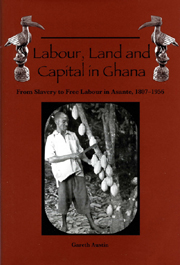Book contents
- Frontmatter
- Contents
- List of Illustrations
- List of Tables
- Preface
- Note on Names
- Maps
- Note on the Maps
- 1 Introduction
- Part I Context and Concepts
- Part II Social Relations of Production and Trade, 1807–1896: Absent and Imperfect Factor Markets
- Part III Slavery as Hobson's Choice: An Analysis of the Interaction of Markets and Coercion in Asante's Era of ‘Legitimate Commerce’, 1807–1896
- Part IV The Decline of Coercion in the Factor Markets of Colonial Asante: Cocoa and the Ending of Slavery, Pawnship and Corvée, 1896–c.1950
- Part V Social Relations of Production and Trade, 1908–1956: Towards Integrated Factor Markets?
- Part VI Freedom and Forest Rent, 1908–1956
- Abbreviations Used in the Notes
- Notes
- List of References
- Index
Part V - Social Relations of Production and Trade, 1908–1956: Towards Integrated Factor Markets?
Published online by Cambridge University Press: 12 September 2012
- Frontmatter
- Contents
- List of Illustrations
- List of Tables
- Preface
- Note on Names
- Maps
- Note on the Maps
- 1 Introduction
- Part I Context and Concepts
- Part II Social Relations of Production and Trade, 1807–1896: Absent and Imperfect Factor Markets
- Part III Slavery as Hobson's Choice: An Analysis of the Interaction of Markets and Coercion in Asante's Era of ‘Legitimate Commerce’, 1807–1896
- Part IV The Decline of Coercion in the Factor Markets of Colonial Asante: Cocoa and the Ending of Slavery, Pawnship and Corvée, 1896–c.1950
- Part V Social Relations of Production and Trade, 1908–1956: Towards Integrated Factor Markets?
- Part VI Freedom and Forest Rent, 1908–1956
- Abbreviations Used in the Notes
- Notes
- List of References
- Index
Summary
This part describes the changing forms of ownership, control and trade in productive resources during and especially following the decline of slavery and pawnship. This history of social relations of production needs to be set in the political context of British over-rule, including the severe limits to colonial administrative capacity and, towards the end of the period, the transition towards an independent Ghanaian state. The story must also be related to the economic context of the gradual transformation of factor ratios that proceeded throughout the period (and beyond): as the area under cultivation continued to spread, cocoa trees to mature, and population to rise. The causes and implications of the outcomes defined in the chapters that follow-discussing successively the changes in the relations of land, capital and labour-will be examined in depth in Part Six. The present part thus performs the same role in our discussion of the post-1908 period as Part Two did in our consideration of the nineteenth century. As there, analysis is an essential means of establishing a consistent description amid conflicting arguments. Much of the evidence presented here is new. In the process we will reconsider the nature of British policies on market institutions in West Africa, review Polly Hill's argument that borrowers and lenders came from the same socio-economic group, and revisit the proposition that cocoa undermined the importance of the extended family in the allocation of resources.
- Type
- Chapter
- Information
- Labour, Land and Capital in GhanaFrom Slavery to Free Labour in Asante, 1807–1956, pp. 251 - 252Publisher: Boydell & BrewerPrint publication year: 2005

